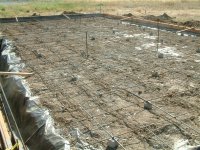Humbleto
Silver Member
I've got a quick question for some of you more knowledgable folks. I'm planning to put up a 30x50 metal building on a slab in the hill country of Texas. Should there be plastic (moisture barrier) under the rebar? The guy I'm using doesn't think there needs to be one. I'm leaning the other way. Any comments??
Thanks in advance
Thanks in advance
